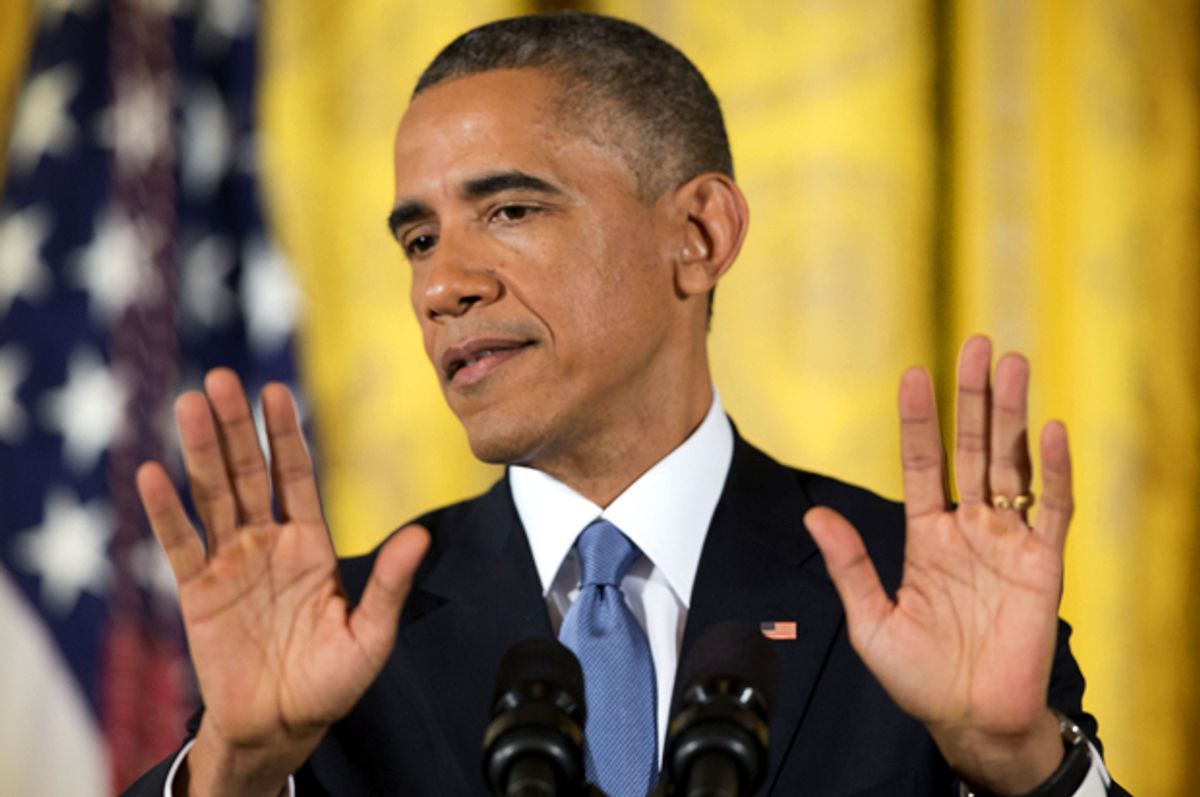There was a predictable conventional wisdom heading into Wednesday's post-election press conference that President Obama would need to announce some sort of vaguely defined course correction, or at least show contrition. That he would need to develop a list of center-right policy proposals to discuss with Mitch McConnell over some sort of ice-breaking lunch. That he would have to abandon the partisan posture that allegedly hung his party out to dry on Tuesday night.
What a shocking development it must have been, then, to see the president not completely change his set of beliefs and priorities overnight after his party fared poorly in a midterm election.
He reiterated his intention to take whatever executive action on immigration he legally can by the end of the year while also encouraging Congress to deliver a comprehensive immigration reform bill that he knows will never come. He said he will veto the bills he believes are bad ideas, such as a repeal of the Affordable Care Act or of its most crucial components. He will be open to working on the right-of-center policy positions that he's always been annoyingly open to: trade deals and corporate tax reform. He still wants to fix bridges and roads and increase the minimum wage. The only major policy that he seemed to introduce -- and it's an important one -- was in welcoming an Authorization for Use of Military Force (AUMF) to define the war against ISIS.
He's basically the same guy he was the day before the election, and that's going to send many in Washington to their fainting couches. Why can't he abandon his plans for executive action on immigration? Why won't he fire someone? Why won't he agree to sign everything the Republicans send him? Doesn't he realize he has to change if he wants to accomplish things with Republicans?
Lest we forget, though, he's been through this once before, after the 2010 elections. And he appears to have learned the right lessons from that: No changes in his behavior are going to cause a rapprochement with Republicans.
Remember the big, sad show he put on after 2010, the last time he was pressured into changing his ways overnight? It makes you wince. Hiring Bill Daley, a person who had no idea what he was doing, to serve as chief of staff in order to curry favor with the "business community." Signing a two-year extension of the top-bracket Bush tax cuts. Allowing Republicans to trick him into negotiating over a raise in the debt ceiling. Trying countless times to pursue a "grand bargain" deficit deal on taxes and social insurance programs.
What he got in return for these efforts was nothing. (And thank God, by the way, that he didn't get a grand bargain.) The Republican Party refused to negotiate with him, because the current Republican Party's identity is forged on being oppositional to Barack Obama. If it were to agree with him on some significant piece of legislation, then that would make Barack Obama something less-than-Satan, which would make the Republican Party ... what?
Let's do a thought experiment. Say Barack Obama dropped his plan to take executive action on immigration in order to foster cooperation with Republicans on passing comprehensive immigration reform. What would happen? He'd be denounced by a significant portion of the Democratic base, perhaps irreparably. And then the Republican leaders in the House and Senate would proceed to do exactly nothing on immigration, because it's not in their members' interests to cut a comprehensive immigration reform deal with Barack Obama. And then Obama, because he is the president, would get the blame for nothing "getting done" in Washington. What possible reason is there for him to delay executive action on immigration? He can either improve the lives of millions of people, excite the members of his party, and have Republicans hate him or improve the lives of no one, depress the members of his party, and have Republicans hate him.
Otherwise, it's not exactly clear what he could do for a "fresh start." The closest and therefore most lazily applied reference is to President George W. Bush's response to his party's 2006 midterm loss, when he fired Donald Rumsfeld. Obama could fire someone, but whom? There is no equivalent to a Rumsfeld in this administration. Bush lost that election because of the Iraq War, and Rumsfeld was the surly household name running the Iraq War. There is no analogous figurehead in the Obama administration waiting to be lopped off. And it's not like Rumsfeld's firing ceased the Bush administration's prosecution of the war, anyway. One of the first things Bush did with his new Democratic Congress was ask for (and receive) funding to deploy tens of thousands of additional troops to Iraq.
If Obama seemed unusually calm in his press conference Wednesday, it's because he felt no pressure to present himself as something other than the center-left technocrat that he is. He learned after 2010 that it doesn't matter whether he presents himself as a center-left technocrat, a center-right technocrat, a budget hawk, John Boehner's golf buddy or whatever: Those who are intent on seeing him as a radical leftist hell-bent on America's destruction will see him as a radical leftist hell-bent on America's destruction, because that's the narrative that works for them.
But sure, if Mitch McConnell wants to have a drink, they can have a drink.

Shares